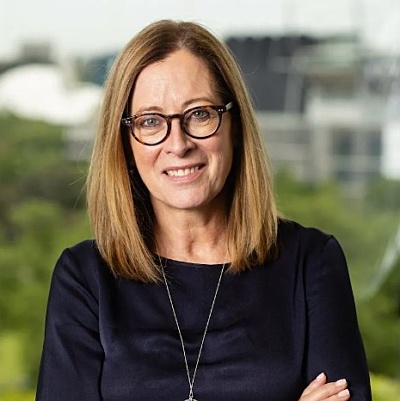
What not-for-profit leaders need to know in 2026
Posted on 12 Feb 2026
Our special NFP trends report distils the views of more than two dozen experts.
Posted on 30 Jul 2024
By Matthew Schulz, journalist, Institute of Community Directors Australia

As the nation’s top philanthropists pack their bags for a sold-out conference in Adelaide next week to discuss cutting-edge charity work, sector advocates are hopeful the Productivity Commission’s report into doubling philanthropy by 2030 will lead to long-overdue reforms of a broken system.

Several hundred philanthropic movers and shakers will hear Charities Minister Andrew Leigh spell out federal Labor’s charity agenda in an early address at the three-day Philanthropy Australia conference.
The latest figures show that charities in Australia distribute more than $11.7 billion each year in donations and grants. Doubling that figure will be a challenge in the midst of a cost-of-living crisis and a tough donations market.
Many delegates will be expecting some indications from the minister about the government’s response to the 468-page report, which it received in May and released to the public this month.
The Community Advocate will be keeping a close eye on conference proceedings – including Dr Leigh’s address – and expects any talk of the Productivity Commission’s recommended shake-up of deductible gift recipient (DGR) status to win the close attention of delegates.
“So many grassroots and volunteer-run charities currently miss out, advocacy charities miss out. There are so many holes and gaps, and it really does need to be reformed.”


As many as 15,000 charities could benefit from proposed deductible gift recipient (DGR) reforms to allow more advocacy groups to win the tax benefit.
These include neighbourhood houses as well as groups working in the fields of poverty, animal welfare, support for women, First Nations people, and advocacy.
Four Paws Australia, the local chapter of a global animal welfare organisation fighting against animal suffering, is among them. The organisation’s national director, Rebecca Linigen, said her organisation was entirely funded by donations, yet supporters were not able to claim tax deductibility.
“Under the current DGR system, animal welfare organisations that advocate for better welfare and treatment of animals are not eligible for tax deductibility, though we are hopeful that this will change soon as a result of the Productivity Commission’s recent review.”

Krystian Seibert, who led the review as an associate commissioner and is now an advisor for Philanthopy Australia, cited the case of the International Campaign to Abolish Nuclear Weapons (ICAN), which jointly won the Nobel Peace Prize for its advocacy against nuclear war yet was unable to claim tax deductibility on donations. The same was true for many neighbourhood houses.
“So many grassroots and volunteer-run charities currently miss out, advocacy charities miss out. There are so many holes and gaps, and it really does need to be reformed,” he said in a podcast interview published last week by the Community Advocate.
He believed expanding and simplifying the DGR status rules would generate “real benefits for those grassroots organisations in communities across Australia”.

The Stronger Charities Alliance believes all registered charities should hold DGR status, including the many advocacy organisations that are currently missing out.
Responding to the release of the report, Alliance spokesperson Hassan Nasir Mirbahar said, “The sector has long demanded simplifying the DGR system and broadening DGR categories to fit the modern Australian charity sector”.
But the Alliance flagged concerns that changes –especially those protecting charity advocacy work – must be acted on in the Albanese government’s first term in office. The Alliance has repeatedly called for greater acceptance of charity advocacy.
“We’re glad to see the Commission’s recommendation to both simplify DGR and extend it to advocacy organisations, many of which currently struggle to get tax-deductibility status under the current system. Charities that engage with policy-making work will benefit from this and help Australia make stronger policies that work for all of us,” Mr Mirbahar said.
“However, enabling a vibrant charitable sector to participate in policy advocacy requires reforms beyond improving philanthropic giving. Federal charity laws do not provide certainty around charities' right to undertake advocacy, which affects both the charitable and philanthropic sectors. Our Voices for Change Survey (2022–23) found that donors were reluctant to fund advocacy work due to legal uncertainty about charitable advocacy.”
There will also be a high level of interest in any regulatory changes Dr Leigh might flag as part of the reforms, with the Australian Charities and Not-for-profits Commission (ACNC) set to receive an injection of additional powers and controls – and presumably resources – to realise the philanthropic push.
The ACNC will be at the centre of many changes, including changes to the regulatory framework for charities and ancillary funds, improved information on charities and donations, and philanthropy involving First Nations communities.

ACNC commissioner Sue Woodward – in her response to the inquiry – accepted that the matters related to giving and funding were critical to the charity and not-for-profit sector.
“There will no doubt be lively debate around some of the recommendations in the report, and we have already seen that starting to play out,” she said, possibly in reference to an angry reaction to the report’s recommendation to scrap DGR status for school building funds.
Private schools reacted furiously to the proposal, which would have sapped millions in charitable donations to independent schools. The move was rapidly stymied by the government, and in fact was the only recommendation to be taken off the table immediately.
Asked how ready the ACNC would be to take up any new responsibilities from an organisational, resourcing, capability, regulatory and timeline point of view, the Commission played a straight bat.
The authority stressed its role an independent regulator that administered charity regulation and law, but avoided commenting on policy development or change.
Nevertheless, Ms Woodward indicated the ACNC was ready to help the sector through any changes.
“Ultimately, our role as the independent regulator is to implement policy which is set by government. If there are any changes that result from the inquiry in future which impact our work in regulating the sector, we will ensure we provide clear guidance and messaging so the sector is well-prepared and resourced.”
“In the meantime, we'll continue to support a culture of giving, especially through our charity register. It is a valuable tool for donors and philanthropists to verify the transparency of organisations they might support, with information such as where a charity operates and the people or causes it supports.”

Leading philanthropy group Australians Investing In Women (AIIW) said the inquiry had the opportunity to embed gender equality at the centre of philanthropy.
The organisation, which recently published groundbreaking research into the power of a gender lens to tackle the nation’s big issues and another study into how corporate Australia could undo harmful stereotypes, was referenced seven times in the Productivity Commission’s findings.
AIIW chief executive Julie Reilly said in the organisation’s submission that “gender-wise philanthropy can be a strategy to increase philanthropic giving by raising awareness, setting an example, building networks, and encouraging innovation”.
The organisation argued gender equality must be a core and preferably compulsory consideration for philanthropists as part of inclusive giving practices, and that currently the sector was being outpaced by the corporate sector in adopting a gender lens approach.

Posted on 12 Feb 2026
Our special NFP trends report distils the views of more than two dozen experts.

Posted on 30 Jul 2025
A major study of Australian charitable giving has found that 4.248 million Australian taxpayers…

Posted on 22 Jul 2025
Charities are facing mounting challenges in attracting donations as household expenses continue to…

Posted on 16 Jul 2025
As debate continues over what percentage of its money a Private Ancillary Fund (PAF) should be…

Posted on 08 Jul 2025
Not-for-profits yet to lodge their overdue self-review return will have to prove they have taken…

Posted on 25 Jun 2025
Revenue for Australia’s charity and not-for-profit sector has reached record highs, and total…

Posted on 23 Jun 2025
Progress towards uniform national fundraising laws is welcome, but it needs to happen much faster,…

Posted on 17 Jun 2025
Donations to community organisations ahead of the end of the financial year have increased for the…

Posted on 17 Jun 2025
Philanthropy Australia has urged the federal government not to “cherry pick” the implementation of…

Posted on 12 Jun 2025
Not-for-profits and charities can now access free one-on-one tech advice to help them identify how…

Posted on 09 Jun 2025
There are more than 60,000 charities in Australia, but they are far from equal, writes Margaret…

Posted on 05 May 2025
Theatre Network Australia co-founder Nicole Beyer’s passion for giving and the arts can be traced…